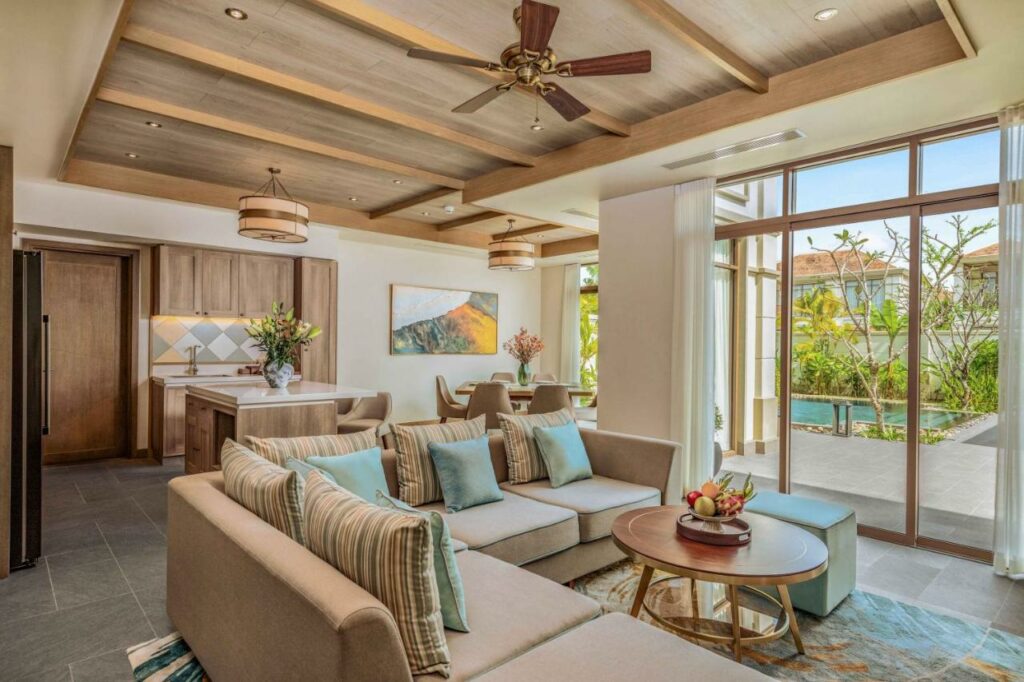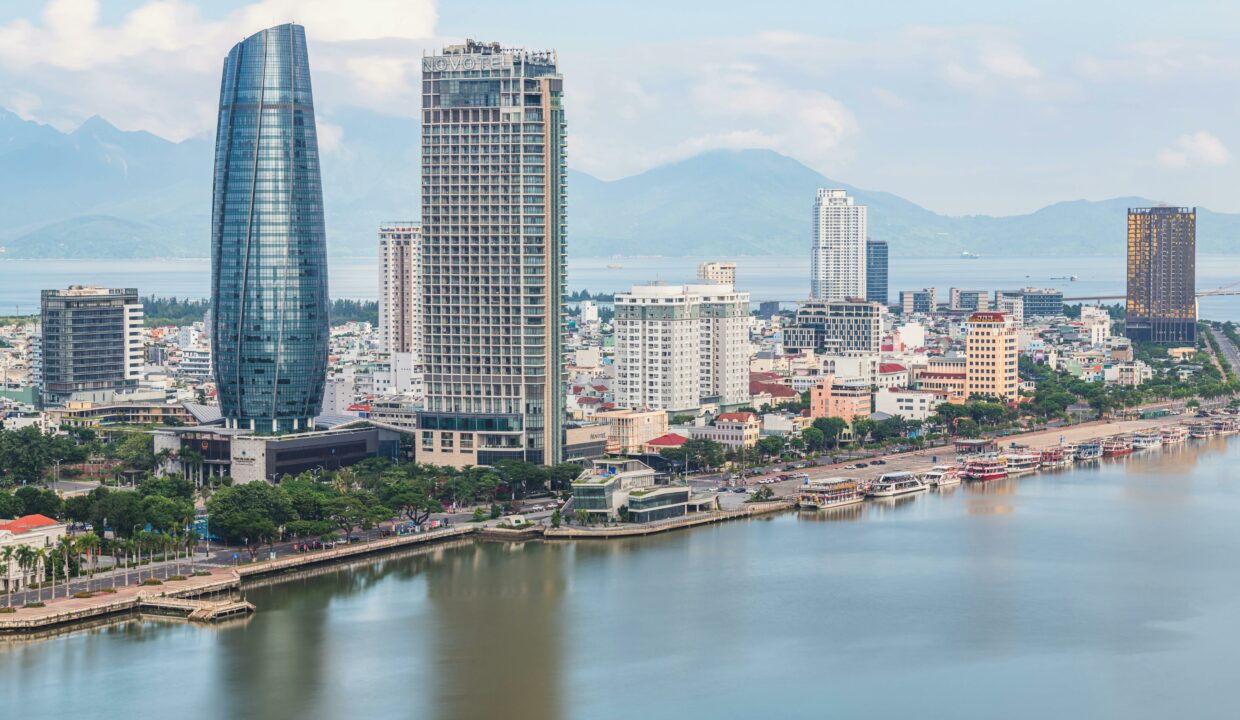Da Nang Real Estate in 2025-2026: Inside the infrastructure boom fueling strong demand
Da Nang is rapidly cementing its status as Vietnam’s next economic powerhouse, with a wave of large-scale infrastructure projects setting the stage for a period of dynamic growth in Da Nang Real Estate in 2025 and beyond. From a deep-sea port to a new financial center, these transformative developments are unlocking unprecedented potential in the city’s apartment, villa, and resort property markets for 2025 and beyond.
The Foundation: Transformative Infrastructure Projects
Da Nang’s future is being built today, with several key projects slated for completion or launch in 2025:
- Lien Chieu Deep-Sea Port: Scheduled for completion in 2025, this port will become a major logistics hub, facilitating cargo flows from the Central Highlands, Laos, and Thailand.
- Da Nang Free Trade Zone (FTZ): Approved in June 2025, this 1,881-hectare zone will create a synergistic ecosystem for manufacturing and logistics by integrating with the port and Hi-Tech Park.
- Da Nang International Financial Centre (IFC): This ambitious project aims to attract significant investment and will pilot digital asset models by late 2025.
- Hi-Tech Park Expansion: The 3,656-hectare park is attracting major international tenants and spurring demand for worker housing, serviced apartments, and logistics hubs in the surrounding area.
Combined with over US$130 million in airport upgrades, these projects are creating a seamless economic backbone designed to blend industry, finance, and innovation.
Residential Real Estate in Da Nang: Market Analysis
Apartments: Supply Growing to Meet Strong Demand
After a subdued period from 2021-2023, Da Nang’s apartment market has recovered with positive momentum.
- Supply: Approximately 1,100 new units were launched in the first half of 2025. Looking ahead, an estimated 12,300 units from 19 projects are expected between H2 2025 and 2027.
- Pricing & Demand: Primary prices are high, averaging VND 77 million per square meter, driven by projects in prime locations from reputable investors. The market attracts a diverse buyer profile, with investors from Hanoi and HCMC targeting Grade A projects and local end-users seeking mid-range options for long-term living.
Villa / Townhouse: A Premium Market with a Mega-Project on the Horizon
This segment is characterized by premium inventory and land plot-oriented supply.
- Performance: Demand is healthy, with nearly all existing villas and shophouses fully absorbed (99%).
- Outlook: The future supply is significant. While around 400 dwellings are expected in 2025, over 10,489 dwellings and plots are anticipated from 2026 onwards.
- The market is keenly awaiting the launch of Vingroup’s new 500-hectare mega-project, Vinhomes Lang Van, which is set to redefine low-rise development in the city.
Condotels: Legal Clarity Unlocks a Stagnant Market
The condotel segment, dormant since 2019 due to legal uncertainties, is finally reawakening.
- The Turning Point: The 2023 Housing Law and supporting decrees have provided crucial legal clarity, recognizing ownership rights and outlining conditions for issuing titles. This has restored investor confidence.
- Upcoming Supply: Supported by recovering tourism, cautious new supply is emerging. The Nobu Residences project launched 264 units in 2025, with an additional 13,160 units anticipated in Da Nang after 2025 from major developments like the Wyndham Soleil Complex, Sun Cosmo, The Legend and Masteri Rivera.
Coastal Villas: Resilient Prices and Positive Prospects

The coastal villa market has shown strong resilience, with secondary prices increasing by an average of 8% per year since 2021.
- Outlook: The administrative merger with Quang Nam province gives Da Nang the longest coastline in Vietnam (over 215 km), creating an uninterrupted tourism corridor that enhances the city’s appeal to coastal real estate investors. From H2 2025 to 2026, 372 new villas are expected to be added from three projects.
With its strategic infrastructure investments and a newly clarified legal landscape, Da Nang is entering a new era of development. The city’s diverse residential offerings, from high-rise apartments to sprawling coastal villas, present a compelling case for investors and homebuyers in 2025 and 2026.
Da Nang Real Estate in 2025: 10 Key Questions for Foreign Investors
What property taxes must a foreigner pay when buying and owning real estate in Vietnam in 2025?
A: Foreign buyers face the same tax rates as locals. Key costs include a one-time Value-Added Tax (VAT) of 10% on new properties from the developer, a Registration Fee of 0.5% of the property’s value to secure ownership, and a Maintenance Sinking Fund of 2% for apartments. Upon resale, a Personal Income Tax (PIT) of 2% on the transaction price is payable by the seller.
Can a foreign investor get a home loan or mortgage from a bank in Vietnam to buy property in Da Nang?
A: It is extremely difficult. Most Vietnamese banks do not offer mortgages to non-resident foreigners. Financing is generally only possible for foreigners with legal residency, a work permit, and proof of local income. As a result, the vast majority of property purchases by foreigners in Vietnam are all-cash transactions.
What specific types of property can a foreigner legally buy in Da Nang under the new 2025 laws?
A: Foreigners can legally purchase apartments, condominiums, villas, and townhouses, but only if they are part of a licensed commercial housing development project. They cannot buy standalone land plots or individual homes that are not within an approved project. The fundamental restriction is that foreigners own the structure, not the land itself.
What is the “pink book” in Vietnam and how does a foreign buyer in Da Nang obtain one?
A: The “pink book” is the official Certificate of Land Use Rights and Ownership of House and Other Land-Attached Assets. It is the ultimate legal proof of property ownership in Vietnam. After the final payment is made and the property is handed over, the buyer (or the developer on their behalf) submits an application with the SPA, passport, and payment proofs to the local Land Registration Office to have the pink book issued.
Are there restrictions on which specific locations or projects a foreigner can buy into in Da Nang?
A: Yes. Foreign ownership is strictly prohibited in areas deemed critical to national defense and security. These zones include border areas, coastal regions essential for security, and areas near military installations or key government headquarters. Local authorities publish lists of projects eligible for foreign ownership, so it’s crucial to verify a project’s status before committing.
What happens to a foreigner’s property in Da Nang after the 50-year leasehold period expires?
A: Foreigners own property on a 50-year leasehold basis. Under the new laws, this leasehold is renewable for one additional 50-year term. The owner must apply for the extension with the provincial People’s Committee before the initial term expires. While renewal is legally possible, the exact policies at the time of expiry will determine the process.
Can a foreigner legally rent out their apartment or villa in Da Nang, and what is the rental income tax rate?
A: Yes, foreigners can legally rent out their properties. If the total annual rental income exceeds VND 100 million (approx. US$4,000), it is subject to tax. The tax is a combination of a 5% Value-Added Tax (VAT) and a 5% Personal Income Tax (PIT) on the rental revenue.
What is the 30% foreign ownership quota in Vietnam and how does it affect buying an apartment in Da Nang?
A: To maintain market balance, Vietnamese law caps foreign ownership at a maximum of 30% of the total units within a single condominium building. For landed property projects (villas/townhouses), the quota is 10% of the total units or a maximum of 250 houses per ward-level area. Before purchasing, investors must verify with the developer that the foreign quota for that specific project has not already been filled.
How does getting married to a Vietnamese citizen change a foreigner’s property rights in Vietnam?
A: Marrying a Vietnamese citizen grants a foreigner property rights nearly equal to those of a local. The 50-year leasehold limitation is removed, allowing for indefinite (freehold-like) tenure. The property can be registered as “common property,” solidifying the rights of both spouses. This is the most significant advantage a foreigner can obtain in the Vietnamese property market.
What is the step-by-step process for a foreigner to complete a property purchase in Da Nang in 2025?
The process is as follows:
1. Due Diligence: Hire a lawyer to verify the project’s legal status and confirm it is eligible for foreign ownership.
2. Reservation Agreement: Sign a reservation agreement and pay a refundable deposit to secure the unit.
3. Sales and Purchase Agreement (SPA): Sign the formal SPA, which details all terms of the sale.
4. Thanh toán: Transfer funds according to the payment schedule outlined in the SPA. All transactions must be in Vietnamese Dong (VND) through a Vietnamese bank.
5. Handover: Receive the completed property from the developer.
6. “Pink Book” Application: Apply for the ownership certificate to finalize legal ownership.

